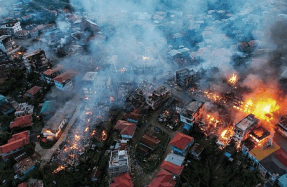A Man of The People


ON 28 OCTOBER LAST YEAR, Heera Singh Markam, a former member of the legislative assembly in Chhattisgarh and a co-founder of the Gondwana Gantantra Party, passed away at a hospital in Bilaspur after a prolonged illness.

None of the short obituaries published in the national newspapers or the tickers on news channels did any justice to the legacy Heera left behind. They mentioned that he was a “prominent tribal leader,” that he “served as the national president of the GGP,” and that he is “survived by his wife and two sons,” among other inane details. Even in Chhattisgarh, Heera’s native state, no single obituary seemed to show any grasp of his legacy and work. Among the English-language national media, only Outlook India, The Week and Republic World covered his death, and all of them carried only a short piece put out by the news agency Press Trust of India. There were no opinion pieces by public intellectuals discussing his contribution to the Adivasi cause. Even Hindi media platforms, such as Navbharat Times and Dainik Bhaskar, only spared a few hundred words covering the news of his passing.
This is no surprise, since it mirrored a clear vacuum even in academic writing. There is no comprehensive work on the GGP’s contribution to Adivasi society, or even to Gond history. The media and the academy have long invisibilised the Gonds’ political assertion in the larger national discourse, and even in the discourse on Adivasis.
Heera Singh Markam was the most prominent political voice of the 12-million-strong Gond, or Koitur, community—the second largest Scheduled Tribe in the country. The Gond tribe, which has a long history and a rich cultural past, has found itself marginalised in the postcolonial Indian state. Even though the community shares a common language and religion, it has been fragmented across seven different states: Madhya Pradesh, Chhattisgarh, Maharashtra, Telangana, Andhra Pradesh, Odisha and Uttar Pradesh. This has led to the imposition of new linguistic identities on Gonds. It has also contributed to the dispossession of their land through increasing migration and the settlement of non-tribal people, making the Gonds “minorities” in their own historical territory and creating a rupture in the community’s relationship with its land and culture.
Heera was an important voice for the Gonds’ longstanding demand of a state of their own, “Gondwana.” He took up several of the community’s causes: preserving Gondi language and identity, resisting Brahminical cultural hegemony and fighting for tribals’ right to their land and resources; opposing the displacement of Adivasis for “development” projects, the destruction of their living environment by mining, and their exploitation by the state in the name of fighting Maoism.
While the GGP’s electoral success may have been limited, Heera has left legacy far greater than anything voting numbers alone could capture. The political representation of tribal people has come a long way. “If Heera dada wasn’t there, who knows where we would have been?” Anil Dhurvey, the national president of the GGP’s youth wing, told me. “We also probably would have run into the forest.” Talking about the Naxal movement, Dhurvey said, “Unfortunately, the guns reached us before the pen.” But the GGP, he added, “drew young people to fight through democratic means.”
HEERA WAS BORN to farmer parents, on 14 January 1942, in the village of Tiwarta, in Bilaspur district of what was then the Central Provinces and Berar. After the division of Madhya Pradesh in 2000, the area became part of Chhattisgarh. The village is now in Korba district, which has become a mining and industrial hub, leading to the displacement of Adivasis in large numbers and severely impacting the local environment.
In a 2019 interview with Forward Press, Heera recalled there was no school in his village. “An educated man gave primary education to some of us, in return, we used to give rice to him every day,” he said.
After he finished middle school, in 1956, Heera was selected for a teacher-training course, and appointed as a teacher in a primary school. He finished high school through distance learning, and finished his graduation and postgraduation from Ravishankar Shukla University, Raipur. Later in life, in 1984, he also secured a law degree from Bilaspur’s Guru Ghasi Das University, graduating with a gold medal.
As a schoolteacher, Heera began showing interest in politics. In early 1980, he resigned and returned to his village. That same year, he contested his first election, as an independent candidate for the Madhya Pradesh Vidhan Sabha from Pali-Tanakhar. He finished second, losing by only a few votes. After seeing the result, Madan Shukla, a Brahmin leader, inducted him into the Bharatiya Janata Party.
In 1985, Heera won his first election, on a BJP ticket from Tanakhar, and entered the state assembly. In the next election, he demanded a ticket from the Janjgir constituency, but the party gave the ticket to Dileep Singh Judev—infamous for leading the “ movement in the region, aimed at bringing Christian Adivasis into the Hindu
You’re reading a preview, subscribe to read more.
Start your free 30 days





